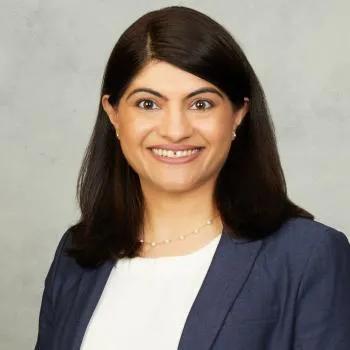Ide-cel Shows Efficacy Earlier in R/R Multiple Myeloma Despite Crossover
During a Case-Based Roundtable® event, Surbhi Sidana, MD, discussed the KarMMa-3 trial of earlier-line CAR T-cell therapy in patients with relapsed/refractory multiple myeloma in the first article of a 2-part series.
Surbhi Sidana, MD
Assistant Professor of Medicine
Blood and Marrow Transplantation and Cellular Therapy
Stanford Health Care
Palo Alto, CA

CASE SUMMARY
- A 60-year-old woman was diagnosed with Revised International Staging System (R-ISS) stage II/R2-ISS stage III IgGκ multiple myeloma.
- Medical history: acute onset of renal insufficiency and hypercalcemia
- Cytogenetics: 1q21+ amplification; t(14:16); high risk
- ECOG performance status: 0
- Patient declined autologous stem cell transplant.
- She received daratumumab (Darzalex), bortezomib (Velcade), lenalidomide (Revlimid), and dexamethasone, followed by lenalidomide maintenance.
- Best response: very good partial response (VGPR)
Two Years Later
The patient experienced her first relapse.
- She continued lenalidomide maintenance therapy.
- On routine follow-up, she reported having mild fatigue but continued to work full-time.
- Bone marrow plasma cells, light chains, and M protein levels rising
- Kidney function worsening; estimated glomerular filtration rate: 22
- Now stage IV chronic kidney disease
- Following second relapse, the patient was initiated on daratumumab, carfilzomib (Kyprolis), and dexamethasone with a best response of VGPR.
Six Months Later
After 2 prior lines of therapy, the patient presented to her oncologist with complaints of increased fatigue and persistent bone pain in her lower back exacerbated by minimal movement.
- She expressed interest in chimeric antigen receptor (CAR) T-cell therapy with her clinical team.
- She also stated that she wants to travel out of the country for her daughter’s wedding in 3 months.
Targeted Oncology: Could you explain the design of the phase 3 KarMMa-3 trial (NCT03651128) and its significance in patients with relapsed/refractory multiple myeloma?
SURBHI SIDANA, MD: KarMMa-3, the trial of ide-cel [idecabtagene vicleucel; Abecma], enrolled patients who have had 2 to 4 prior lines of therapy, so [it did not include] the very early relapses with 1 prior line. They had to be refractory to the last regimen. It was a 2:1 randomization to ide-cel vs standard of care [SOC], and there were 5 different options. Very importantly, it was a crossover design. If you were randomly assigned to SOC, you could then cross over and get CAR T-cell therapy. This will become important because of the overall survival [OS] data [where] the curves don't separate out, probably because of crossover.
Bridging therapy was optional; if I was the one designing the trial, I wouldn't design it like this. It was optional and [must be] 1 cycle or less with a minimum 14 -day washout. [A total of 225 of 254 patients in the experimental arm] received CAR T-cell therapy with 150 to 450 million cells in the CAR T-cell arm. The patients in the comparator arm received standard regimens until progression. Over 200 patients received CAR T-cell therapy, and 126 patients received SOC. The primary end point was progression-free survival [PFS] and secondary end points were overall response rate [ORR], OS, etc.
The big picture is that the characteristics were well balanced [between the arms].1 Over 90% of these patients were daratumumab refractory, 95% and 93% [in the experimental and SOC arms, respectively], which tells you this is a very heavily treated population. The median number of prior lines of therapy for this trial was 3, so even though it's an earlier trial [than the prior KarMMa trial (NCT03361748)], it's not an early-line trial. The median number of lines of therapy for the initial approval was 5 and this is 3, so most patients had exhausted conventional options by this time point. it's important to keep this in mind because the results do look different between the 2 trials.
What were the key efficacy outcomes in this trial?
This trial was positive, meeting its primary end point for PFS.2 The median PFS for the CAR T-cell therapy arm was almost 14 months, and the median PFS for the SOC arm was 4 months. So SOC did just as I would have expect it to do [in patients with] 3 prior lines of therapy. The CAR T-cell therapy arm did better than what ide-cel results showed in the fifth-line setting, which was a median of 9 months of PFS.
The ORR was also better in the ide-cel arm, 71% vs 42%. The control arm did just as I would have expected; we expect an ORR of 30% to 40% at this stage. This is almost 2 times [better], which is great. The complete response rate was 44% with ide-cel vs 5% in SOC. When patients get a response, many of them get a deep response with CAR T-cell therapy. Even the PFS2, which is the PFS with the next line of therapy, was 23.5 months and with the SOC regimens was 16 months. These patients did better [with ide-cel than SOC] combined with the next line of therapy even though crossover was possible.